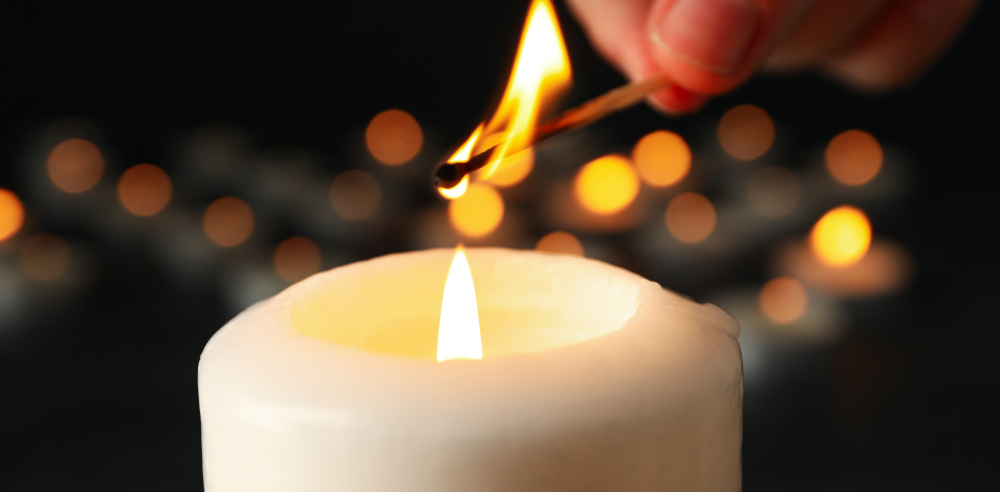
When the Candle Burns Too Fast
The power went out just before the kettle boiled. It always does. The timing so precise it feels intentional, like the grid has learned your habits and resents them. You could hear the last gurgle of water threatening to tip into steam before everything stopped, the fridge silenced mid-hum, the ceiling light clipped off, and the world collapsed into one single remaining source of glow, the candle on the counter.
It’s an old one. Bent slightly. Smells vaguely of wax paper and the back of a drawer. You don’t even remember where you bought it, but it’s been there through so many outages it’s starting to feel like a housemate. You light it without ceremony, using the last of the gas lighter’s wheeze, and the room shifts immediately. The edges of everything soften. Shadows multiply. The silence becomes heavier. Loadshedding isn’t just the absence of electricity. It’s the arrival of something else. A timeline. A rhythm. A space where feelings come out and language changes its tone.
You watch the wax start to drip. First a slow surrender, then faster. The heat works like honesty. Melting through the pretence of the day. You hadn’t planned to cry, but here it is, this quiet urge rising from somewhere you thought was closed. No one cries with the TV on. No one admits to aching when the fan is still spinning. But the candle burns and your body remembers what still hasn’t been said.
In other rooms, the pattern repeats. A mother washes dishes in the dark, not because she has to, but because her hands don’t know what to do otherwise. A man steps outside and smokes alone, watching the moon like it might interrupt him. Two teenagers sit on opposite sides of a couch, the buffer of Netflix gone, left now with just each other and whatever awkwardness the day didn’t have time for earlier. A child asks, “When’s the light coming back?” and nobody answers properly.
The timeline begins at minute zero with irritation. A WhatsApp left unsent. A half-cooked meal. A ruined Zoom call. But by minute twelve, that fades. And something older takes over. Memory. Stillness. Ghosts of family members who lived entire lives by candlelight, not just two-hour blocks of it. You start to see them, your grandmother boiling water over coals, your father listening to static on a transistor radio. You realise how much of what we call ‘routine’ is built on a current we don’t control.
Some people talk during loadshedding. Not loud, just enough to keep the dark company. The kind of talk that skips news and moves straight into things like, “Do you ever think we’d have moved if Mama didn’t get sick?” or “I still remember that dog we had when I was five. The brown one.” The candle doesn’t interrupt. It flickers with agreement, bends its light over each speaker like a listener who never judges.
 Others stay quiet. Not out of discomfort, but out of reverence. The silence during loadshedding isn’t passive. It’s charged. It holds more weight than any background music ever could. It forces you to sit with yourself in ways you avoid when the plugs are working. Some people lie down. Not to sleep, but to remember. Or to not remember. To wait. To let the wax count something other than time. Regret, maybe. Or loneliness. Or hope.
Others stay quiet. Not out of discomfort, but out of reverence. The silence during loadshedding isn’t passive. It’s charged. It holds more weight than any background music ever could. It forces you to sit with yourself in ways you avoid when the plugs are working. Some people lie down. Not to sleep, but to remember. Or to not remember. To wait. To let the wax count something other than time. Regret, maybe. Or loneliness. Or hope.
By minute forty-five, you’ve usually adjusted. You know where the matches are. You’ve moved your tasks around. Maybe the conversation has found its pace. Maybe you’ve already forgiven someone without saying it. Or felt the apology you’re not ready to give yet forming itself quietly inside your chest. You check your phone for battery, then leave it alone. The candle’s still burning. A little faster now.
There’s an intimacy to it all. Not romantic, necessarily. Just close. Real. Whether you’re alone or with others. Whether you’re in a shack or a double-storey house. Loadshedding becomes this leveller. This great unmasking. Nobody looks particularly powerful in candlelight. Nobody scrolls Instagram with the same intensity when the world feels slightly medieval. It’s just people, and stories, and breath. There’s something beautiful about that. Painful too.
The last fifteen minutes always feel the longest. You’re no longer fully immersed in the candle world, but not yet returned to the electric one. You start listening for the fridge. The click of the geyser. That distant hum that signals modern life is about to resume. But there’s also a small, strange mourning when it does. Like the spell breaks. Like the weight returns. You weren’t ready to go back.
And when it comes, when the light snaps back with a sharp clarity, it feels too bright. Too much. The room looks different. Dustier. Less kind. You blink, adjusting. Someone makes a joke about Eskom. Someone else sighs. But no one says what really shifted. What healed or cracked or stirred while the world was paused. That stays in the silence. In the wax. In the parts of you only the candle got to see.
The candle itself is smaller now. Shortened. A bit misshapen. Still standing though. Like you. Ready for the next time the city goes dark, and the heart, left too long unattended, asks again to be witnessed, not fixed. Just seen. In soft, flickering light.




